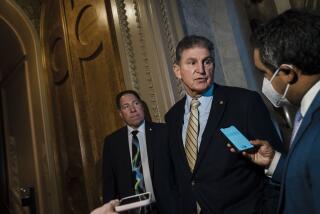Medical Accounts Talks Back on Track
- Share via
WASHINGTON — In a breakthrough that vastly improves the prospects for significant health insurance reform this year, congressional negotiators Thursday resolved a central dispute on tax-free medical savings accounts that for months has stalled legislation to make it easier for people to keep health insurance.
The agreement, hammered out by key lawmakers in private talks, authorizes a limited trial of the new accounts, a concept favored by many Republicans but opposed by Democrats and the Clinton administration.
The agreement resurrects health care legislation that many assumed had fallen victim to election-year partisan bickering.
“We’re back on track,” said Sen. Edward M. Kennedy (D-Mass.), the leading opponent of the medical savings accounts who finalized the long-sought compromise in talks with House Ways and Means Chairman Bill Archer (R-Texas), the leading proponent of the savings accounts.
The next step is for House and Senate negotiators to address other important, but less contentious, parts of the bill. Lawmakers warned that there were still potential sticking points, but voiced optimism that they could be resolved.
“Millions of Americans will soon benefit from legislation making health care more available and affordable,” Archer said.
Senate Minority Leader Tom Daschle (D-S.D.) said further progress will hinge on “how intransigent” Republicans will be on remaining issues.
Different versions of the bill have been passed by the House and Senate, but disputes over the medical accounts were so bitter that Republicans and Democrats could not even agree to convene the conference committee to conduct formal negotiations.
Resolution of the impasse may also clear the way for final action on unrelated legislation to raise the minimum wage. That bill stalled after being passed by the House and Senate because some Republicans insisted the health care bill must be resolved first.
The health insurance bill represents a far more modest and incremental stab at the problem than the overhaul pushed without success by President Clinton in 1994. But it would be a significant bipartisan accomplishment for Congress to act on a problem affecting many Americans: the threat of losing health insurance coverage because they change or lose jobs or because of an existing medical condition.
The central provision of the bill would make it easier for workers to carry their health insurance with them from job to job and make it more difficult for insurers to refuse coverage to those with existing medical problems.
*
Some analysts have estimated that 25 million people a year could benefit from having “portable” health insurance; as many as 80 million have ailments that could subject them to exclusion from coverage because of preexisting conditions. The bill stalled amid controversy over the GOP proposal that authorized medical savings accounts, which would allow a person to open an individual, tax-deferred bank account and draw from it to pay for routine medical services until a high-deductible catastrophic insurance plan kicked in. Republicans hailed the idea as a way to give people a new health insurance option that would make consumers more cost conscious. But many Democrats and other critics are concerned that it would primarily benefit wealthy and healthy people and draw them away from traditional insurance plans.
Under the compromise reached by Kennedy and Archer, the medical savings accounts would be tested in a pilot project that would make no more than 750,000 policies available to workers in businesses with fewer than 50 employees and to the self-employed.
After four years, the experiment would be evaluated, and while people holding the the accounts could keep them, the program would be extended to the rest of the country only if Congress voted to do so.
More to Read
Sign up for Essential California
The most important California stories and recommendations in your inbox every morning.
You may occasionally receive promotional content from the Los Angeles Times.














